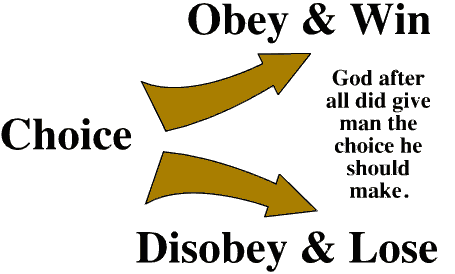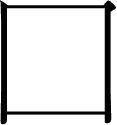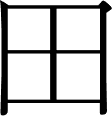Genesis 2:4-17 – The Bible Teaching Commentary
Relationship of God and Man
C. Purpose of Creating Man (Genesis 2:8-17)
Now a river flowed out of Eden to water the garden; and from there it divided and became four rivers. The name of the first is Pishon; it flows around the whole land of Havilah, where there is gold. And the gold of that land is good; the bdellium and the onyx stone are there. And the name of the second river is Gihon; it flows around the whole land of Cush. And the name of the third river is Tigris; it flows east of Assyria. And the fourth river is the Euphrates.” Genesis 2:10-14, NASB.
1) The Garden of Eden (Genesis 2:10-14)God did not create a garden but ‘planted’ one. But note, the garden is not Eden. The garden was in in the eastern section of Eden (towards the rising sun). Eden was not itself a garden but a fairly large district. The Hebrew word ‘Eden’ means pleasure or delicacy. If Eden was pleasurable, the garden must have been exquisite. Where are those people who talk about the Old Testament God being fierce?! God has never changed from His goodness. We are surprised at the space taken to describe the rivers. Only one verse is used to describe man’s creation (2:7), but five are used to describe the river. There is a hidden message here. One river flowed out from Eden. Either it was a spring that came from the ground or a tall mountain stream that flowed down to the garden. Once the river reached the center of the garden, it divided itself into what would become four huge rivers. This would necessitate a huge garden. The names of some of the rivers are familiar to us; others are not. We suspect they are the same but necessary. River #1 was Pishon: flows around Havilah where there is good gold, bedllium and onyx stone. There are two Chinese characters for garden. One describes the garden above with its four rivers. The other describes the garden’s occupants.
So perhaps the whole of Eden was in a lofty place, but the garden was at a lower plateau where the rivers would gain more momentum as they flowed on out of Eden to the other parts of the world. Because of the identity of the Tigris and Euphrates Rivers, we suppose this land was near the present day rivers. The whole land of Eden seemed central and all the known world was centered around it. We see one river flowing from God’s new paradise. The river stood for the blessing that came from God and would bring enriching provisions to the world. One could easily see how the Garden would seem like the throne of the world subjected to a higher throne in heaven. This thought of God’s divine blessing flowing to earth from His above throne is very common in scripture (see Psalm 65:9-13).
2) Adam's Calling (Genesis 2:15)Man was not originally in the garden. God made man and then the garden. After the garden was made, God placed man there. We don’t live in the new home until it is finished!
(1) Cultivate the garden: implies the growing of crops. (2) Keep the garden.: manage so that it stays ordered We might call it a job. What was he paid? Let’s say that he was nicely rewarded. We should always keep in mind the point of our work. It is to serve God. Adam was to keep the garden because God wanted him to. There is no other ifs and buts. In the end, we are to serve God faithfully. We are not more faithful because our boss is kind or gives good bonuses or fringe benefits. Adam was God’s steward. He needed to rightly manage God’s resources. We likewise are to be duty conscious. In the end, we are to only work what God has given us to do. Perhaps God has given a business to a man. That employer hires us. We are still working for God. Whether in a high rise office or on a farm on a wide plain, the situation is the same. We always are working for God. 3) Adam's Command (2:16-17)
Ownership
|
|||||||||||||||||||||||||||||||||||
Two Trees |
God gave man a lot of choices. Adam had lots of kinds of fruit to eat from. In verse 2:16 God clearly points out the vastness of Adam’s choices. “From any tree of the garden you may eat freely?” Diversity brings extra satisfaction and knowledge that God really has thought about his needs and wants to please him.
Any’ tree points to the choices in life. We might think of it as entering a modern supermarket. The choices are many - they were also free. This is where the supermarket model stops! God wonderfully provided for them.
If we can just pause here to think of the great abundance of things that God gives to us. God made this world and provided these good things. Man was not required to first do this or that to show his worthiness to receive such things. Not at all. They were his to enjoy. We can almost see the task to cultivate and keep (before the hard labor came in) were designed to enable man to further enjoy the good things God has given him.
Some of us have a wrong image of our Father God. Jesus said it so clearly in Matthew 6. God freely gives to His creation. Man did not first have to prove his worthiness before he received something from God. Not at all. We had received and then tested on how we would comply to one small command. Even when we have done bad or good, still God has given us so many things. We need not only be thankful but cultivate a faithful and thankful heart.” From any tree of the garden you may eat freely.”
Boundaries

Direct |
God gave man a responsibility to refrain from eating from the “tree of the knowledge of good and evil.” As much as modern man detests boundaries and limitations, God made it a part of Adam’s life from the start. Man must trust God’s wisdom for His commandments.
The commands in 2:16-17 are very different than his instruction of keeping the garden. This command includes both general guidelines as well as a prohibition. This was the test., a test of their faithfulness and compliance.
There is also a prohibition (see character ‘to forbid’). After creating many trees, man was only told not to eat from one tree. “But from the tree of the knowledge of good and evil you shall not eat, for in the day that you eat from it you shall surely die” (Genesis 2:17).
|
God did not try to trick man. It was clearly placed so that man would not accidentally eat from it. Along with the prohibition came a warning of the dire consequences. If he ate from that tree, then he would surely die. God spoke clearly.
Modern man cannot tolerate the thought that man should be restrained from one decision. They prize themselves in being able to discern good and evil and make the best choices. We think we know how to rate things. We can’t understand why God would not want us to eat from this tree or at least not force us on our decisions. We pay literal thousands of dollars to gain this knowledge. We consume thousands of hours acting as judge over the right and wrong of what is happening in our society. We always believe our judgment on these things is the most accurate.
Discussion: Do we really need to know and experience things to make the best decisions?
4) Ethics of two trees
People ask a number of tough questions regarding God’s purpose of place the tree of knowledge of good and evil there in the garden. Clearly, God could not have put the tree there. God deliberately put the tree there along with the prohibition.
-
Can the garden be perfect with the tree of the knowledge of good and evil?
-
Could man be content without eating from this tree?
-
Why did God put that tree there?
What was man’s knowledge like when God formed him?
Adam did not know good and evil as God did (Genesis 3:22). God desired to keep Adam innocent of this knowledge, at least for a period of time, and perhaps forever. He, however, knew the consequence of eating from that one tree (“you shall surely die”). That was sufficient knowledge to direct Adam and Eve’s choices.
How did the eating of the forbidden fruit change man?
When Adam sinned, he not only found out the difference between good and evil but also became acquainted with evil. His ‘world’ fell apart. His judgment became askew. Knowledge tainted with corrupt desires corrupted his future choices and life.
The prohibition was a window of opportunity. Man had a chance to show himself faithful. He was not tempted beyond what he could handle. In fact, if anything, everything was tilted to help man choose to be faithful. God created many many trees all of which were good. Only one, not fifty percent, were off limits.
We likewise need to practice this kind of choice each day, many times each day. We have opportunities to follow or not follow Christ. We can obey God in that or disobey Him. Some things have become such a pattern in our lives like reading and meditating on God’s Word, that we no longer think of the issue of obedience. But it is. It is also the important link to doing more.
When a Christian faces temptation, he is much more like Adam than when we were in our old nature. We have overcome the evil one through Christ. We now have the Spirit of God through which we can obey. Satan tries to fool us and make us defeated or that God’s plan is not the best.
- List one time that you encountered a situation where you faced a test. How did you do? What could have alternately happened? How did it affect your relationship with God?
- Are Christians like Adam before he sinned, that is, morally free? Read Colossians 3:10 and Ephesians 5:8-9.
Conclusion
 Meaning in life comes about when we seek to please and glorify God. This is the reason we were made. Happiness in life comes through doing what God wants not what we want. This is the world’s wrong conclusion. Meaning in life comes about as we recognize God did make us like robots fulfilling His work but humans who can grow in their relationship with God. The Lord reached out to mankind when He sent His Son to die for His people so that they could have a close relationship with God through Jesus’ death on a tree.
Meaning in life comes about when we seek to please and glorify God. This is the reason we were made. Happiness in life comes through doing what God wants not what we want. This is the world’s wrong conclusion. Meaning in life comes about as we recognize God did make us like robots fulfilling His work but humans who can grow in their relationship with God. The Lord reached out to mankind when He sent His Son to die for His people so that they could have a close relationship with God through Jesus’ death on a tree.
Joy, contentment and fulfillment all come from such a relationship. God didn’t make man a robot because He wanted to have a close relationship with man. He wanted to share His joy in mankind. In chapter 3 we will see what that relationship looked like a bit more.
God invested so much in man (creation, time and energy). Anything else would have been easier. God, however, wanted man on his own to choose to serve Him from his own free will. God did a lot of things to help man, but man needed to love God from his own hear
A. Preparation for Man (Genesis 2:4-6)
B. Creation of Man (Genesis 2:7)
C. Purpose for Man (Genesis 2:8-10)
Quiz on Genesis 2:4-10
BFF Homepage | Top | Back | Bible Topics | Genesis Links | Genesis Overview | Quiz
Biblical Foundations for Freedom






 to forbid
to forbid